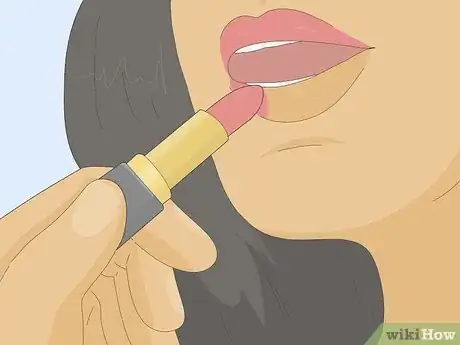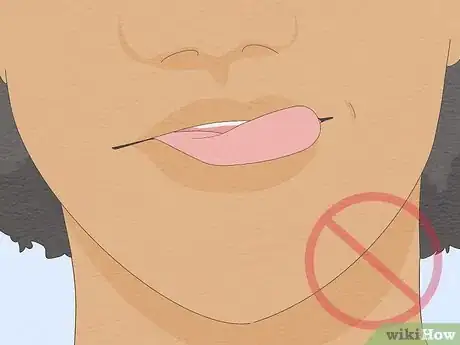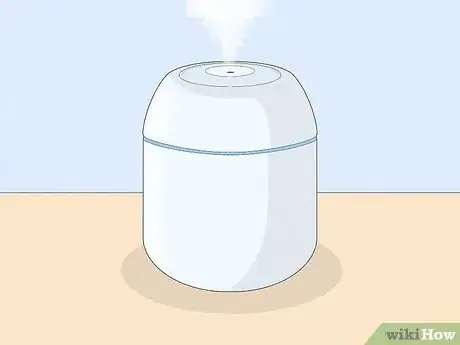This article was medically reviewed by Shari Forschen, NP, MA. Shari Forschen is a Registered Nurse at Sanford Health in North Dakota. Shari has worked in healthcare since 1996 and her expertise lies in acute care bedside nursing on a medical oncology floor. She received her degree from Medcenter one College of Nursing in 2003 and her Family Nurse Practitioner Masters from the University of North Dakota in 2014. Shari is a member of the American Nurses Association.
There are 11 references cited in this article, which can be found at the bottom of the page.
This article has been viewed 34,402 times.
Dry or chapped lips can be a symptom of dehydration, sunburn, dry weather, excessive licking, certain allergens, and more. Relieving chapped lips is relatively easy and painless, but it's important to go beyond relief and treat the underlying cause, too. Follow the tips on this list to heal your lips and prevent chapped lips in the future.
Steps
Cover your lips with unscented lip balm or ointment.
-
This treats and protects your lips from cracking in cold, dry weather. Choose a product that contains natural ingredients like cocoa butter, vitamins A and E, beeswax, petroleum jelly, or dimethicone. Apply it several times a day, especially any time before you go outside. Carry the balm with you during the day and continue to moisturize throughout the day.[1] X Trustworthy Source National Health Service (UK) Public healthcare system of the UK Go to source
- Try applying balm after you brush your teeth or wash your face. Toothpastes, mouthwashes, and facial cleansers alter your mouth’s PH and can cause chapping.
- Another good time to apply balm is right before you go to bed, to keep your lips moist during the night.
Use lip balms with SPF.
-
Getting sunburn on your lips leads to chapped lips. To avoid getting a sunburn on your lips, wear a lip balm that has an SPF of 15 or higher. Be sure to apply the sun protection to your lips before going outside.[2] X Trustworthy Source American Academy of Dermatology Professional organization made of over 20,000 certified dermatologists Go to source
- When buying balm, look for one designed for all-day use that has an SPF rating.
Wear lipstick.
-
This is an alternative to lip balms and ointments. Although it does not work as well as balms and moisturizers, it does provide a limited amount of protection from the sun and wind. Avoid light lipsticks that will intensify the effects of the sun and, instead, choose tinted lipsticks that reflect more sunburn-causing UV rays.[3] X Research source
- Look for lipstick that has an SPF rating of 15 or higher for added protection from the sun.
- Matte lipstick can dry out your lips so it’s important to apply moisturizer in the night and in the morning before you apply lipstick. This helps your lips hold their moisture.[4] X Research source
Try applying honey to your lips.
-
This is a natural home remedy for dry lips. Rub a little bit of all-natural, organic honey over your lips to soothe them when they’re feeling dry and cracked. Besides moisturizing and healing your lips, honey can even act as a mild exfoliator to remove dead, flaking skin.[5] X Research source
- Honey sure is tasty, but try not to lick it off your lips if you want it to do its job of healing them!
Exfoliate your lips regularly with a lip scrub.
-
Removing the dead skin cells lets your lips absorb moisturizers better. Once a week, rub a lip scrub all over your lips to exfoliate them and get rid of dry flakes of skin. After you exfoliate, immediately apply some moisturizing lip balm or a natural moisturizer like coconut oil to your lips to hydrate them.
- You can make your own moisturizing and exfoliating sugar scrub by mixing brown sugar crystals with olive oil or coconut oil.
- Avoid using any kind of abrasive exfoliating scrubs on your lips if you have a history of cold sores, as they can make your condition worse.
Avoid products that contain camphor, eucalyptus, and menthol.
-
These ingredients actually dry out your lips and make chapping worse. This can lead to a vicious cycle in which you apply this kind of balm to your dry lips, drying them out even more, leading you to use more balm. Make sure any lip balms or ointments you use don’t contain any of these additives.[6] X Trustworthy Source Cleveland Clinic Educational website from one of the world's leading hospitals Go to source
- Instead, use products that contain natural oils like castor seed oil, hemp seed oil, and mineral oil.
Avoid products with fragrances and dyes.
-
Various allergens can irritate your lips and lead to chapping. Things like cosmetics and skincare products can contain such irritants in the form of fragrances and dyes. Use products that are fragrance-free and dye-free to try and avoid allergens that can make your lips dry out.[7] X Trustworthy Source Mayo Clinic Educational website from one of the world's leading hospitals Go to source .
- Look for hypoallergenic products to be extra sure they don’t contain allergens that can irritate your lips.
Cover your mouth in cold or windy weather.
-
Harsh wind, and cold, dry air sap moisture from your lips. Use some sort of face covering like a scarf, bandana, or face mask to cover your mouth when you go outside when it’s cold or windy. You wouldn’t go outside in the cold without a jacket and other protective clothing, but it’s really easy to forget about your lips![8] X Trustworthy Source Cleveland Clinic Educational website from one of the world's leading hospitals Go to source
- This is especially important if you’re doing some type of winter sport like skiing or snowboarding.
Breathe through your nose.
-
Mouth breathing can dry out your lips because of the constant airflow. Make a conscious effort to breathe in and out of your nose whenever possible. This limits the amount of air flowing back and forth over your lips so they stay more moist.[9] X Trustworthy Source Mayo Clinic Educational website from one of the world's leading hospitals Go to source
- If you have a stuffy nose and difficulty breathing through it, try some nasal decongestants to clear it up so you don’t have to keep breathing through your mouth so much.
Try not to lick your lips.
-
Regularly wetting your lips with saliva dries out your lips more quickly. It might temporarily feel like you’re moisturizing them, but once the saliva evaporates from your lips, they are drier than before. Try to catch yourself any time you feel like licking your lips and resist the temptation to do so.[10] X Trustworthy Source Cleveland Clinic Educational website from one of the world's leading hospitals Go to source
- Any time you feel like licking your lips is a good time to reapply some lip balm or ointment.
Do not pick or bite off flakes of dried skin.
-
This will make your lips bleed and, consequently, heal more slowly. Resist the urge to touch or peel any sores or cracks and allow your lips to heal. Repeated touching of sores or cracks can also lead to infection or possibly make you ill. [11] X Trustworthy Source National Health Service (UK) Public healthcare system of the UK Go to source
- Irritating the skin around your mouth can trigger a cold sore if you have the herpes simplex virus, which adds to the soreness and dryness of your lips.
Stay hydrated.
-
If you are dehydrated, your body pulls water from places like your lips. Keep a bottle of water with you throughout the day and drink some whenever you feel thirsty. Other beverages that hydrate include herbal teas and juices.[12] X Trustworthy Source Mayo Clinic Educational website from one of the world's leading hospitals Go to source
- Aim to drink about 15.5 cups (3.7 L) of water or other hydrating fluids per day if you’re a male or 11.5 cups (2.7 liters) if you’re a female.[13] X Trustworthy Source Mayo Clinic Educational website from one of the world's leading hospitals Go to source
Turn on a humidifier when you’re at home.
-
This keeps the air inside moist. Plug a humidifier in your bedroom at night or in whatever room you spend a lot of time in when you’re hanging out at home. Turn it on whenever you’re at home so the inside air doesn’t contribute to your dry lips.[14] X Trustworthy Source American Academy of Dermatology Professional organization made of over 20,000 certified dermatologists Go to source
- You can get small portable humidifiers online for as little as about $15 and bigger models for under $50.
You Might Also Like



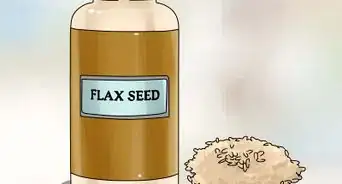
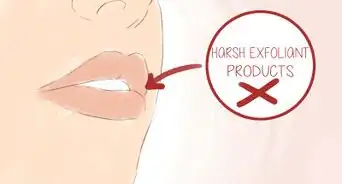


References
- ↑ http://www.nhs.uk/conditions/dry-lips/Pages/Introduction.aspx
- ↑ https://www.aad.org/media/stats/prevention-and-care/sunscreen-faqs
- ↑ http://www.skincancer.org/prevention/sun-protection/sunscreen/sun-protection-and-makeup
- ↑ http://stylecaster.com/beauty/how-to-keep-matte-lipstick-from-drying-out-lips/
- ↑ https://share.upmc.com/2017/02/how-to-treat-chapped-lips/
- ↑ https://health.clevelandclinic.org/2015/03/6-tips-to-protect-your-lips-from-the-cold/
- ↑ http://www.mayoclinic.org/diseases-conditions/dry-skin/expert-answers/chapped-lips/faq-20057819
- ↑ https://health.clevelandclinic.org/2015/03/6-tips-to-protect-your-lips-from-the-cold/
- ↑ http://www.mayoclinic.org/diseases-conditions/dry-skin/expert-answers/chapped-lips/faq-20057819
- ↑ https://health.clevelandclinic.org/6-tips-to-protect-your-lips-from-the-cold/
- ↑ http://www.nhs.uk/conditions/dry-lips/Pages/Introduction.aspx
- ↑ http://www.mayoclinic.org/healthy-lifestyle/nutrition-and-healthy-eating/in-depth/water/art-20044256
- ↑ https://www.mayoclinic.org/healthy-lifestyle/nutrition-and-healthy-eating/in-depth/water/art-20044256
- ↑ https://www.aad.org/public/everyday-care/skin-care-basics/dry/heal-dry-chapped-lips
About This Article



